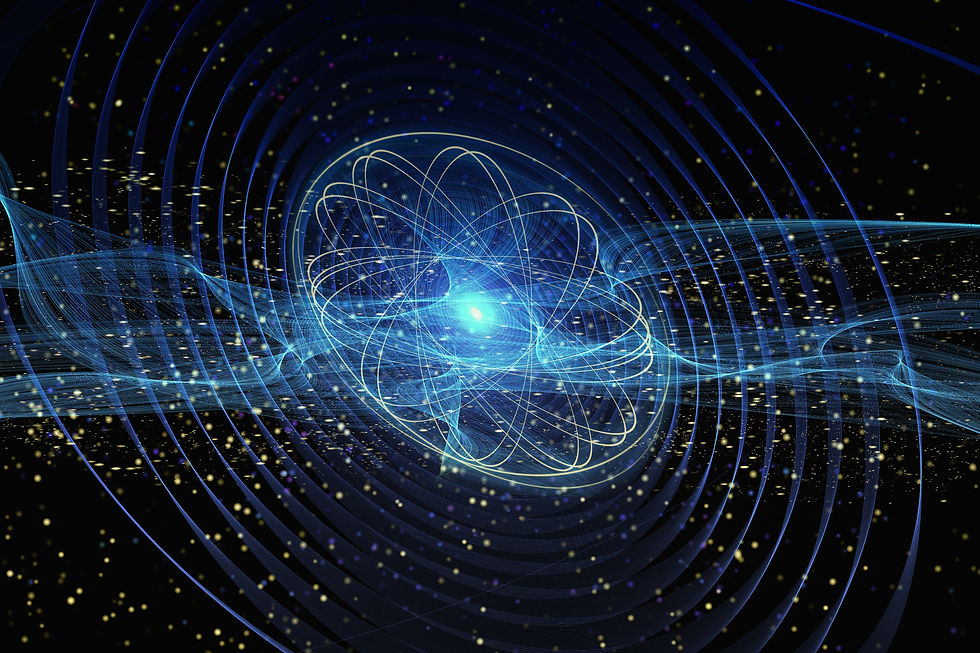Quantum AI - Tesseract or Tease?
- Rana Bhattacharjee

- May 26, 2022
- 4 min read

In the epic blockbuster superhero movie, The Avengers, Loki, the antagonistic god of mischief seeks the power of a blue, prism-like object that contains the power to destroy entire planets. This object is known as the Tesseract. Of course, given the nature of high-budget Hollywood extravaganzas, this almighty source of power does not fall in the wrong hands, (until Thanos, of course), but let’s just leave aside extravagant fiction for a second and focus on the real world.
What if you were to grasp a similar power in your hands, but this time, not to destroy but to power an entire planet. That kind of power is what Quantum Computing enthusiasts are hyping the entire technological sector about with Quantum AI.
It is the next big thing. But what is it really? And how much does this power hold up when put to the test?
Quantum Computing: The Scope
Computing has come a long way since Charles Babbage fit the analytical engine in a room - a machine that was four times the size of a grand piano. We moved on to transistors, computers, smartphones and smart devices. With quantum computing, physicists and engineers dare to unlock a new era of computing that focuses on developing computing technology based on the principles of quantum theory - the behavior of energy on a subatomic level.
Challenges of Storage and Analysis
The data packets in quantum data are segregated in qubits for processing power. The catch-22 challenge of analysis and storage of quantum data lies in the very nature of quantum data itself. Due to superposition and entanglement - the two attributes that make quantum data valuable - quantum data is not easy to track. It is also noisy and disappears quickly because of environmental noise. This is called ‘decoherence’.
Using Hybrid Models
Most data derived from quantum processors to generate quantum data is meaningless. Thus, a hybrid model that combines classical computing models with quantum data is effective when powered by fast processing systems such as CPU and GPU.
Different Set of Algorithms
When put side-by-side with classical computing, quantum computing introduces an entirely new set of instructions to proceed with when it comes to algorithms. With superposition and entanglement, the objective remains the same - to get to the finish line much faster than traditional methods.

Quantum AI: A Primer
Quantum AI is defined as the use of quantum computing for running machine learning algorithms. By the very nature of quantum computing as well as the computational and processing advantages it presents, quantum computing can achieve results that are not possible with traditional computing systems.
The Process of Quantum AI
Quantum AI works by converting quantum AI to the quantum dataset. This data is envisaged as an intricate array of numbers known as quantum tensors. From this intricately arranged data model, quantum neural network models are procured. Given that the dataset is in an entangled set by virtue of it being a quantum model, quantum processing is initiated to extract the necessary information.
Through accurate measurement of quantum states, classical information in the form of samples is extracted from the classical distribution. Thereafter, the converted data from quantum to classical is put to machine learning techniques in order to find pattern-recognition between the data.
Use Cases of Quantum AI
There are various use-cases for quantum computing in AI in the near future. By performing better, faster and using more optimized algorithmic models, quantum computing AI can be a real force to reckon with. The categories include, but are not limited to:
Learning Algorithms: Deep-learning processes can be upgraded and set up with quantum learning models. This can lead to better, faster and more optimized network models for self-learning AI and enhance the profundity of artificial neural networks.
Decision Problems: Decision trees branching off into various points can become complex models that take too much time to solve by classical models. Hamiltonian time evolution and other similar quantum computing algorithms can enhance efficiency and save time.
Search Engines: Quantum computing can prove to be even faster than classical computing models and prove helpful in areas such as cryptography, encryption etc.
Game Theory: Game theory is widely applied in classical AI applications. By applying quantum field mechanics to game theory, key problems in quantum communication and quantum-based AI can be solved.
Is it worth the hype?
As with any emerging technology, proponents and critics exist on both ends of the spectrum. Be it Virtual Reality in the 70s (Jarod Lanier, one of the foremost innovators hailed VR as being akin to technology’s ‘lucid dream activation’), or quantum computing now, hype cycles of technologies ebb and flow until they reach a realistic median of use-case. As of now, quantum computing almost matches up with AI in terms of hype in the silicon valley, as evidenced by billion dollar investments by the biggest companies in the world such as Alphabet, Amazon and Microsoft. But how much of it holds up to realistic evaluation?
The problem with quantum computing application starts with how difficult it is to initiate technology that can solve its inherent problems. Quantum-error correction, a process that countervails ‘decoherence’ or the natural dispersion of quantum states due to environmental noise, needs to be done on a massive scale for use-case applications to realistically exist.
Most progressively advanced quantum computers today have dozens of decohering physical qubits. To make one that could crack RSA codes would need many millions of qubits out of which less than a lakh would be used for computation. The rest would be needed to cancel out decoherence - a sophisticated method of error correction.
Thus, only time will tell if quantum computing holds up to the test of time and experimentation. But, it is fair to say that the promise of the tesseract is worth the toil.


Comments